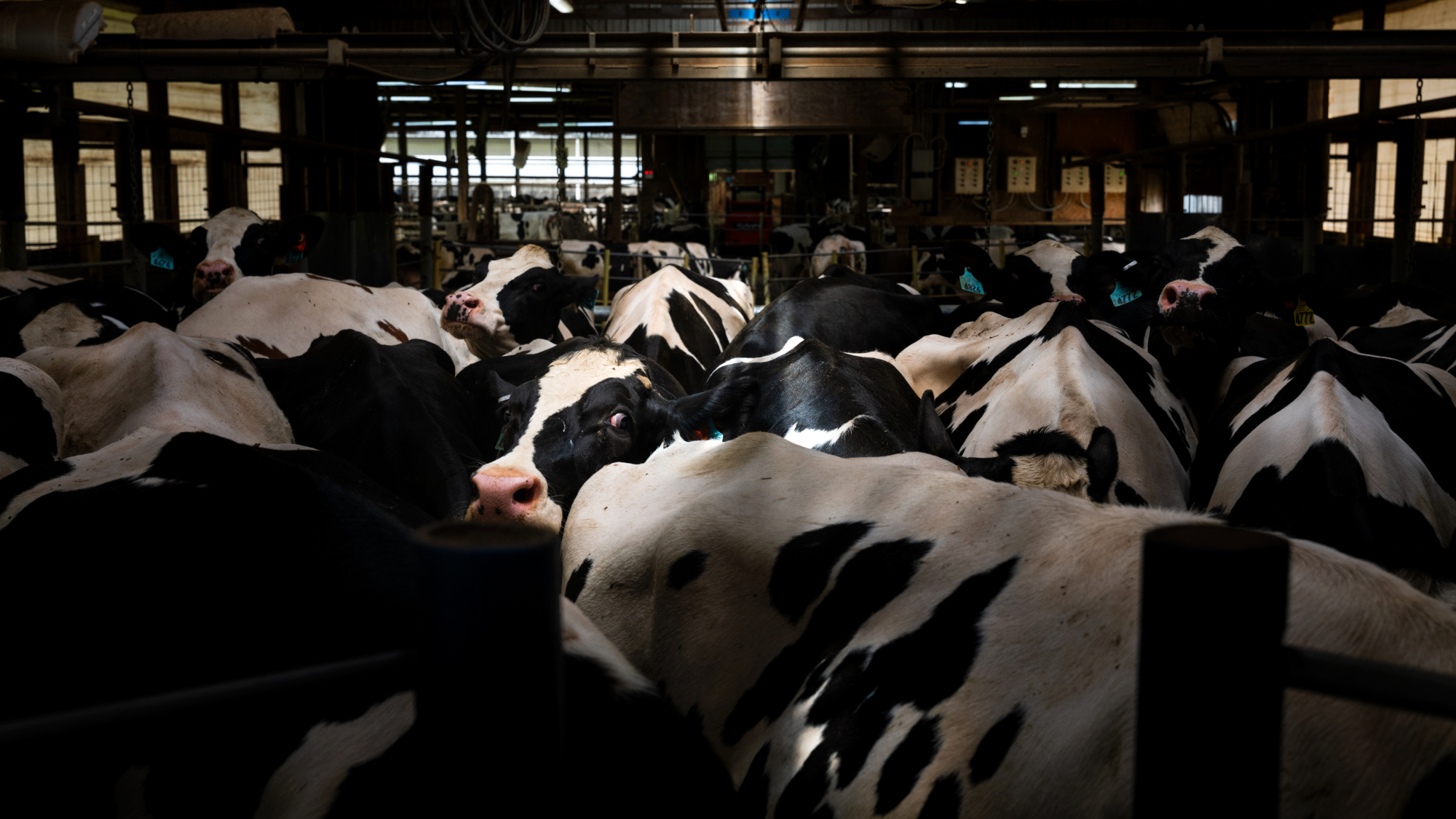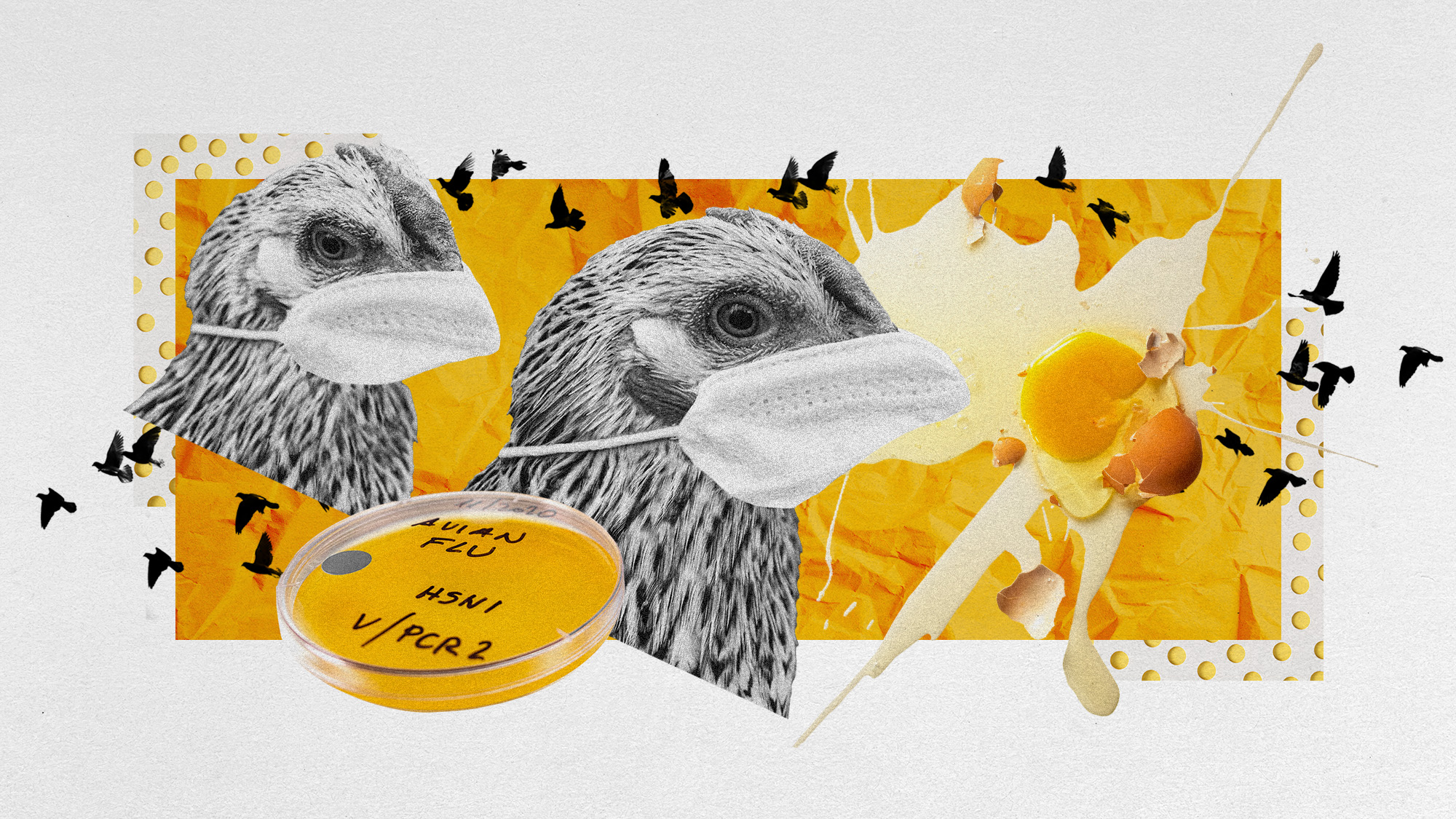Will swine flu be the next global pandemic?
New G4 flu strain has jumped from pigs to humans

A free daily email with the biggest news stories of the day – and the best features from TheWeek.com
You are now subscribed
Your newsletter sign-up was successful
Researchers in China have discovered a new type of swine flu that has spread to humans and could cause a global pandemic.
The virus, G4, is genetically descended from the H1N1 strain that caused the 2009 swine flu pandemic.
It has “all the essential hallmarks of being highly adapted to infect humans”, say the authors of the study, scientists at Chinese universities and China’s Center for Disease Control and Prevention.
The Week
Escape your echo chamber. Get the facts behind the news, plus analysis from multiple perspectives.

Sign up for The Week's Free Newsletters
From our morning news briefing to a weekly Good News Newsletter, get the best of The Week delivered directly to your inbox.
From our morning news briefing to a weekly Good News Newsletter, get the best of The Week delivered directly to your inbox.
The researchers found that any existing immunity humans had gained from exposure to seasonal flu does not provide protection from G4, reports The Guardian.
While the virus has already passed from animals to humans, there is not yet evidence that it can be transmitted between humans.
That means “there is no imminent threat of a new pandemic”, says Sky News.
But experts say that the world is “overdue” an influenza pandemic, reports Live Science - and that it could “strike without warning”.
A free daily email with the biggest news stories of the day – and the best features from TheWeek.com
Can we avoid a flu pandemic?
World Health Organization (WHO) director-general Dr Tedros Adhanom Ghebreyesus warned last year that the “threat of pandemic influenza is ever present”.
“The on-going risk of a new influenza virus transmitting from animals to humans and potentially causing a pandemic is real,” he said as the UN health agency launched a new influenza strategy aimed at protecting people worldwide from the virus. “The question is not if we will have another pandemic, but when.”
The WHO has said it will read the Chinese study on G4 with care.
WHO spokesperson Christian Lindmeier said on Tuesday: “It also highlights we cannot let our guard down on influenza and need to be vigilant and continue surveillance even in the coronavirus pandemic.”
According to Adolfo Garcia-Sastre, a professor of microbiology at New York’s Icahn School of Medicine at Mount Sinai, there is “no good way” to predict exactly when such an outbreak will occur, “but this is something that happens every ten to 40 years”.
How great a threat does influenza pose?
The seasonal flu mutates a small amount each year, but usually remains fairly similar to previous strains to which most people have developed a natural immunity.
Pandemic flu, however, is “a different animal”, says CNN’s chief medical correspondent, Dr Sanjay Gupta.
“Unlike seasonal flu, pandemics occur when a completely new or novel virus emerges,” Gupta explains. “The result is something mankind has never seen before: a pathogen that can spread easily from person to defenceless person, our immune systems never primed to launch any sort of defence.”
The 20th century saw three such flu pandemics. First came the so-called Spanish flu in 1918, which is believed to have infected between 20% and 40% of the world’s population, and killed 50 million people.
Four decades later, the Asian flu of 1958 and 1959 claimed two million lives. A further million people died in 1968, from the Hong Kong flu.
The most recent influenza pandemic was swine flu, which made the leap from pigs to humans in 2009 and killed more than 200,000 people.
The new discovery of G4 swine flu virus has led to the authors of the study to call for the Chinese government to monitor those working with pigs.
“It is of concern that human infection of G4 virus will further human adaptation and increase the risk of a human pandemic,” the researchers wrote.
One reason why flu viruses remain a problem for humans is that they are “multiple and ever-changing”, says Reuters.
The Times agrees that influenzas are “particularly tricky customers, largely because of how two entirely separate strains can swap genetic material if they cross paths in a single host”.
“This can lead to an entirely new viral strain, capable of sustained human-to-human transmission. If this virus has not circulated before, the entire global population will be susceptible,” the newspaper continues.
–––––––––––––––––––––––––––––––For a round-up of the most important stories from around the world - and a concise, refreshing and balanced take on the week’s news agenda - try The Week magazine. Start your trial subscription today–––––––––––––––––––––––––––––––
How will the next pandemic emerge?
Experts say that almost all of the disease outbreaks that have plagued humans over the millennia have started out among other animals.
As science writer David Quammen puts it, “zoonotic spillover” - the transfer of viruses from animals to humans - is “a word of the future, destined for heavy use in the 21st century”.
Vincent Racaniello, a microbiology professor at Columbia University in New York, says that “the first thing people need to understand is that every virus that you can think of that infects people - polio, measles, herpes, chickenpox - they all came from animals”.
He believes that in order to prepare for the next outbreak, scientist should create a “global atlas of zoonotic pathogens, a catalogue of the bugs that exist in other species that have the potential to spill over into the human population”, says The Times.
Although the new G4 pig flu is capable of infecting humans, the absence of human to human transmission means there is no immediate threat of another pandemic, said Carl Bergstrom, a biologist at the University of Washington.
How could the next outbreak be tackled?
Vaccines can help control the seasonal flu, which is why WHO recommends annual vaccination - especially for vulnerable people such as babies, the elderly and anyone with underlying health issues.
But the health agency says that more far-reaching measures are needed to tackle a potential pandemic. The two key goals are to “improve worldwide capacities for surveillance and response - by urging all governments to develop a national flu plan - and to develop better tools to prevent, detect, control and treat flu, such as more effective vaccines and antiviral drugs”, reports Reuters.
Yet despite such measures, “bigger cities, global travel, intensive animal farming, a rising human population - all will increase our vulnerability”, says The Times.
According to experts at the US Centers for Disease Control and Prevention, humanity’s “promiscuous treatment of nature” all but guarantees more pandemics.
Or as Mike Davis, author of The Monster At Our Door: The Global Threat of Avian Flu, explained in a recent interview with New York Magazine, “most epidemiologists believe that we live in an age of pandemics… and a [flu] outbreak is imminent”.
Chinese foreign ministry spokesman Zhao Lijian said that China was closely following developments relating to the new disease. “We will take all necessary measures to prevent the spread and outbreak of any virus,” he said.
-
 What to know before filing your own taxes for the first time
What to know before filing your own taxes for the first timethe explainer Tackle this financial milestone with confidence
-
 The biggest box office flops of the 21st century
The biggest box office flops of the 21st centuryin depth Unnecessary remakes and turgid, expensive CGI-fests highlight this list of these most notorious box-office losers
-
 The 10 most infamous abductions in modern history
The 10 most infamous abductions in modern historyin depth The taking of Savannah Guthrie’s mother, Nancy, is the latest in a long string of high-profile kidnappings
-
 How dangerous is the ‘K’ strain super-flu?
How dangerous is the ‘K’ strain super-flu?The Explainer Surge in cases of new variant H3N2 flu in UK and around the world
-
 This flu season could be worse than usual
This flu season could be worse than usualIn the spotlight A new subvariant is infecting several countries
-
 The new Stratus Covid strain – and why it’s on the rise
The new Stratus Covid strain – and why it’s on the riseThe Explainer ‘No evidence’ new variant is more dangerous or that vaccines won’t work against it, say UK health experts
-
 Bird flu one mutuation from human threat, study finds
Bird flu one mutuation from human threat, study findsSpeed Read A Scripps Research Institute study found one genetic tweak of the virus could enable its spread among people
-
 WHO declares mpox a global health emergency
WHO declares mpox a global health emergencySpeed Read An outbreak of the viral disease formerly known as monkeypox continues to spread in Africa
-
 Brexit, Matt Hancock and black swans: five takeaways from Covid inquiry report
Brexit, Matt Hancock and black swans: five takeaways from Covid inquiry reportThe Explainer UK was 'unprepared' for pandemic and government 'failed' citizens with flawed response, says damning report
-
 The bird flu fight is faltering
The bird flu fight is falteringTalking Points Are pandemic lessons going unheeded?
-
 Car fatality rates are driving up
Car fatality rates are driving upThe Explainer The dang Covid pandemic made us worse drivers